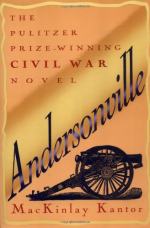The first, and almost superhuman difficulty was to get outside the Stockade. It was simply impossible to scale it. The guards were too close together to allow an instant’s hope to the most sanguine, that he could even pass the Dead Line without being shot by some one of them. This same closeness prevented any hope of bribing them. To be successful half those on post would have to be bribed, as every part of the Stockade was clearly visible from every other part, and there was no night so dark as not to allow a plain view to a number of guards of the dark figure outlined against the light colored logs of any Yankee who should essay to clamber towards the top of the palisades.
The gates were so carefully guarded every time they were opened as to preclude hope of slipping out through theme. They were only unclosed twice or thrice a day—once to admit, the men to call the roll, once to let them out again, once to let the wagons come in with rations, and once, perhaps, to admit, new prisoners. At all these times every precaution was taken to prevent any one getting out surreptitiously.
This narrowed down the possibilities of passing the limits of the pen alive, to tunneling. This was also surrounded by almost insuperable difficulties. First, it required not less than fifty feet of subterranean excavation to get out, which was an enormous work with our limited means. Then the logs forming the Stockade were set in the ground to a depth of five feet, and the tunnel had to go down beneath them. They had an unpleasant habit of dropping down into the burrow under them. It added much to the discouragements of tunneling to think of one of these massive timbers dropping upon a fellow as he worked his mole-like way under it, and either crushing him to death outright, or pinning him there to die of suffocation or hunger.
In one instance, in a tunnel near me, but in which I was not interested, the log slipped down after the digger had got out beyond it. He immediately began digging for the surface, for life, and was fortunately able to break through before he suffocated. He got his head above the ground, and then fainted. The guard outside saw him, pulled him out of the hole, and when he recovered sensibility hurried him back into the Stockade.
In another tunnel, also near us, a broad-shouldered German, of the Second Minnesota, went in to take his turn at digging. He was so much larger than any of his predecessors that he stuck fast in a narrow part, and despite all the efforts of himself and comrades, it was found impossible to move him one way or the other. The comrades were at last reduced to the humiliation of informing the Officer of the Guard of their tunnel and the condition of their friend, and of asking assistance to release him, which was given.




